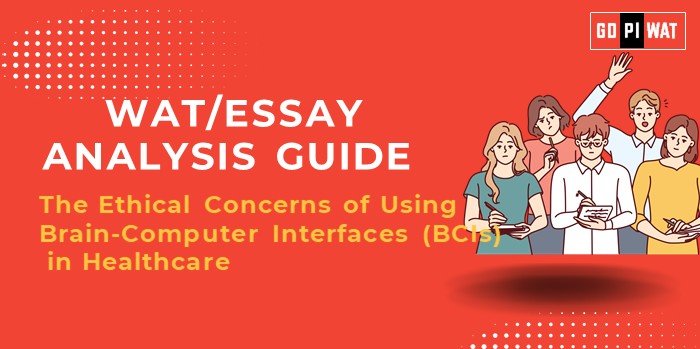📋 Written Ability Test (WAT) / Essay Analysis Guide
🧠 The Ethical Concerns of Using Brain-Computer Interfaces (BCIs) in Healthcare
🌟 Understanding the Topic’s Importance
The use of BCIs in healthcare represents a convergence of medical innovation, data ethics, and patient rights. This topic prompts students to explore the delicate balance between technological advancement and ethical considerations.
⏱️ Effective Planning and Writing
- Time Allocation:
- 🕒 Reading & Planning: 5 minutes
- 🖊️ Writing: 20 minutes
- 🔍 Review: 5 minutes
- Preparation Tips:
- Research key ethical dilemmas in medical technology.
- Consider global perspectives and real-world case studies.
✍️ Introduction Techniques for Essays
- Contrast Approach: “While BCIs empower paralyzed patients to communicate and regain mobility, they simultaneously expose them to potential data breaches and ethical exploitation.”
- Solution-Based: “The transformative potential of BCIs in healthcare must be tempered by stringent ethical frameworks to ensure equitable and safe adoption.”
📖 Structuring the Essay Body
✨ Achievements:
- 🤝 Transformative Capabilities: BCIs enable paralyzed patients to regain mobility and communicate effectively.
- 🔬 Advancements in Neurological Research: BCIs offer insights into brain function, aiding treatment of disorders like ALS and epilepsy.
⚠️ Challenges:
- 🔒 Privacy Concerns: BCIs collect sensitive neural data, raising risks of breaches and misuse.
- ⚖️ Consent Complexities: Obtaining fully informed consent is challenging in vulnerable patient populations.
- 🌍 Societal Fears: Public apprehension about misuse of BCIs for surveillance or coercion.
🌍 Future Outlook:
- 📜 Global Regulations: Developing international standards for data security and ethical use.
- 🤝 Equity-Focused Advancements: Ensuring that BCIs are accessible to patients across socioeconomic strata.
📄 Concluding Effectively
- Balanced Perspective: “BCIs in healthcare symbolize a dual-edged sword; their integration demands innovation hand-in-hand with ethical diligence.”
- Global Comparison: “Countries like the USA and Europe showcase innovation and regulation, providing a roadmap for ethically sound adoption of BCIs.”
🔍 Analyzing Successes and Shortcomings
- ✨ Achievements: Improved patient outcomes, neurological research advancements, rehabilitation capabilities.
- ⚠️ Challenges: Consent complexities, data security concerns, inequitable access.
- 🌍 Global Context: Compare leading innovators like the USA with regulatory pioneers like Europe.
💡 Recommendations for Sustainable Progress
- 🔒 Develop Stringent Policies: Establish robust consent and privacy frameworks.
- 🌐 Ensure Global Equity Standards: Promote policies to make BCIs accessible across socioeconomic strata.
- 🤝 Encourage Collaboration: Foster partnerships between governments, developers, and ethicists to address ethical concerns comprehensively.
📚 Sample Short Essays
- Balanced Perspective: “BCIs have redefined possibilities in healthcare, but ethical considerations like privacy and consent must guide their development.”
- Solution-Oriented: “To fully harness BCIs’ potential, a robust framework addressing data security and equitable access is essential.”
- Global Comparison: “While the USA drives innovation in BCIs, Europe’s regulatory rigor highlights the need for ethical guardrails in medical technology.”


